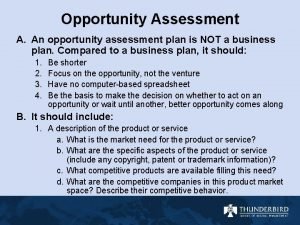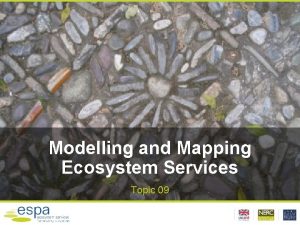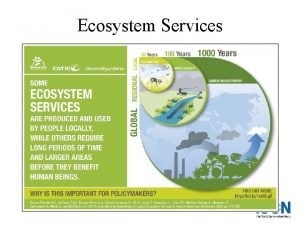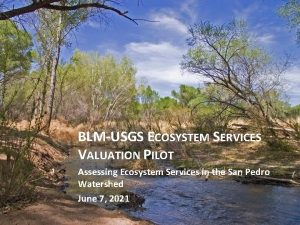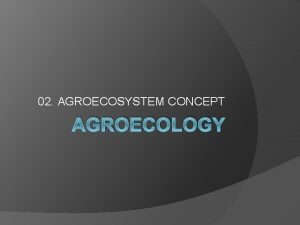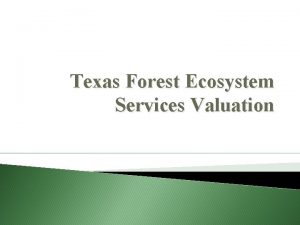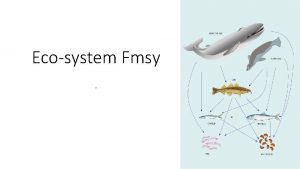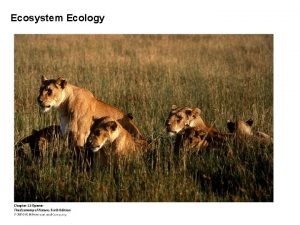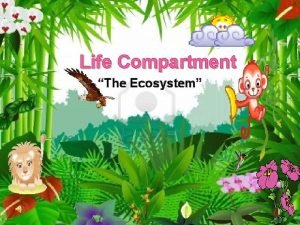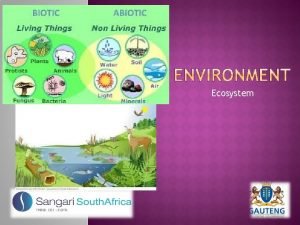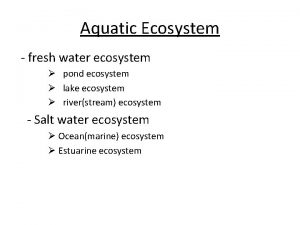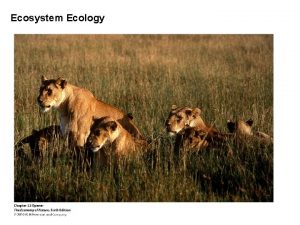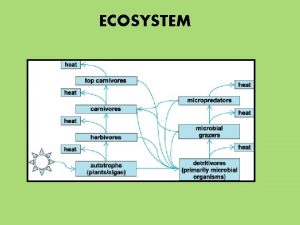ES and Agroecology Ecosystem Services an opportunity for















- Slides: 15

ES and Agroecology Ecosystem Services: an opportunity for agroecology? Marc Dufrêne and Nicolas Dendoncker

ES and Agroecology Ecosystem Services: Ecosystems’ dependencies for human well-being FOSSIL FUELS SUPPORTING -Soil fertility and structure -Nutrient cycling -Water cycling -Genetic biodiversity REGULATING -Soil maintenance -Pollination -Pest control -Habitat for crop auxiliaries -Water purification -Air quality FOR BY PROVISIONING -Food -Fibres -Agro-fuels AGROECOSYSTEMS FOR BY NOT IN MARKET -Water conservation -Soil conservation -Carbon storage -Landscape aesthetics -Spirituality -Habitats for Fauna and Flora

ES and Agroecology Ecosystem Services: Why should we care? • Because everybody else does!

ES and Agroecology Ecosystem Services: Why should we care? • Because an ES assessment framework can provide a comprehensive yet operational tool for natural resource management and land use (including agricultural) planning • Analytical-deliberative frameworks need to be developed, e. g. in the context of land consolidation plans • The links between agroecology and ES have however yet to be unraveled

ES and Agroecology Impacts Drivers Pressures Ecosystems Services Society Many publications on direct impact of agroecological practices on (functional) biodiversity and ecosystems Only very few on final and global impact on a large diversity of ES

ES and Agroecology One meta-analysis on 12 ES : Kremen and Miles, 2012. Ecosystem services in biologically diversified versus conventional farming systems: benefits, externalities, and trade-offs. Ecology and Society. biodiversity soil quality nutrient management water-holding capacity Weak evidence control of weeds control of diseases control of pests pollination services Positive effect but not sufficient carbon sequestration energy efficiency resistance to climate change crop productivity Strong evidence Conclusions : • more research and field experience need to be conducted • as one practice influences multiple ES, research must be holistic • detailed agroecological research is needed to develop crop productivity and region-specific approaches to control of weeds, diseases and pests

ES and Agroecology Holistic approach : nested structure and processes Plot Farm Landscape Multiscalar effect of agroecological methods on ES

ES and Agroecology : what are the links ?

Capital, work, energy Agroecological methods Mixed varieties Mixed crops Livestocks Plot - fields Functional agrobiodiversity Soil structure & fertility, water supply, pollination, genetic diversity, biological control, … Neutral biodiversity Natural areas Landscape Riparian corridors Woodlots Meadows s s Biotic factors Farm Crop rotation Cover crops Fallow fields Abiotic factors (Supporting services) Hedgerows Buffer strips Ecosystem services Provisioning Nutrition, water supply, materials, energy Regulating Pollution, water & mass flow, climate, biotic Cultural Recreational, aesthetic, symbolic values Well-being (benefits and values) Farmer Community Society

Energy Pollutions Floods Climate Biological processes Natural surroundings Non-rival activities Empowering people other benefits Rival activities Symbolic values Neutral biodiversity Insurance value Farmer health cultural Materials regulating Water provisioning Food supporting Functionnal biodiversity Agroecological practices and ES Soils Adapted from Gliessman (2007) ES and Agroecology Plot scale Species association Permanent cover Mulching, compost Integrate livestock Aerial nitrate fixation Biological control Agroforestry Reduced tillage Genetic diversity X X X X X X X X X X X X X X X X X X X X X X ● ● ● X X X X X X X X X X X X X X X X X X X X X X X X X X X X X X X X X X X Interfaces Tree strips Grassland strips Nature protection Farm scale Polycultures Alternative markets Organic farming Agrotourism Local knowledge ● Potentially negative effect X Adapted from Kremen & Miles (2012) or expected trends

ES and Agroecology improve ES bundles Soil quality regulation From mono-functional landscape Water provision Livestock Water regulation Storm protection Erosion control Timber production Climate regulation Air quality Pollination Crop capacity to multi-functional landscape Adapted from Maes et al. (2011). European assessment of the provision of ES.

ES and Agroecology There are significant correlations between the need of • autonomy at farm level and • ES balance at landscape level Farm Plot Landscape consolidation Landscape Harvest Regulating ES Establish Grazing Provisioning ES Food Energy Fibers Supporting ES Milk Cultural ES Animal Manure

ES and Agroecology Research proposal : unraveling the links between agroecology and ecosystem services to facilitate an agroecological transition • Research and field experience on agroecological methods

ES and Agroecology One example : Agriculture. Is. Life project at Gx-ABT • Performance of non-conventional agro-ecosystems ? • Valorisation of field residues ? • Tools and methods ? • Alternative valorisation of agricultural products ? Food Biodiversity Outdoor activities Water supply Materials Natural surroundings Energy Biological control Climate regulation Pollution regulation Erosion regulation => 15 Ph. D working together on 40 ha of experimental fields 1. Agroforestry 2. Intercropping 3. Agrosylviculture 4. Herbaceous strips 5. Residue management & cover crops

ES and Agroecology Research proposal : unraveling the links between agroecology and ecosystem services to facilitate an agroecological transition • Research and field experience on agroecological methods • Holistic monitoring of large case studies (mid and long term) • Economic analyses of farms and (local) food systems • Research to optimise landscape structure to maximise ES, farm or local community autonomy • PES analyses to evaluate when to support farm constraints Thank you for your attention !
 Introduction to agroecology:
Introduction to agroecology: What is opportunity assessment plan
What is opportunity assessment plan Prepaid legal business opportunity
Prepaid legal business opportunity Entrepreneurial opportunity in human services
Entrepreneurial opportunity in human services Changes in the global value of ecosystem services
Changes in the global value of ecosystem services Changes in the global value of ecosystem services
Changes in the global value of ecosystem services What are ecosystem services?
What are ecosystem services? What is ecosystem
What is ecosystem What are ecosystem services?
What are ecosystem services? Formuö
Formuö Novell typiska drag
Novell typiska drag Tack för att ni lyssnade bild
Tack för att ni lyssnade bild Vad står k.r.å.k.a.n för
Vad står k.r.å.k.a.n för Shingelfrisyren
Shingelfrisyren En lathund för arbete med kontinuitetshantering
En lathund för arbete med kontinuitetshantering Underlag för särskild löneskatt på pensionskostnader
Underlag för särskild löneskatt på pensionskostnader

